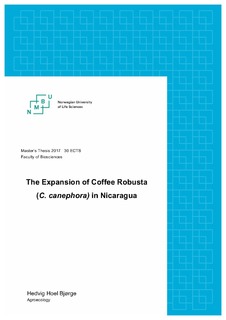| dc.contributor.advisor | Nicolaysen, Anna Marie | |
| dc.contributor.advisor | Westengen, Ola | |
| dc.contributor.author | Bjørge, Hedvig Hoel | |
| dc.coverage.spatial | Nicaragua | nb_NO |
| dc.date.accessioned | 2017-07-20T12:39:33Z | |
| dc.date.available | 2017-07-20T12:39:33Z | |
| dc.date.issued | 2017 | |
| dc.identifier.uri | http://hdl.handle.net/11250/2449175 | |
| dc.description.abstract | An increasing number of small-scale rural farmers in developing countries are involved in the so-called global trade market, producing crops such as coffee, tea, cacao, and banana to the Western Hemisphere. In Nicaragua, the production of coffee is of social, economic, and ecological importance to rural farmers. In 2005, Nestlé and Mercon, a Nicaraguan coffee export company introduced coffee Robusta (Coffea canephora) to Nueva Guinea, a municipality in the Caribbean region of Nicaragua. In 2016, over 200 rural farmers had invested in the production of Robusta, and the coffee is sold as instant coffee on the national market. The objective of this study is to analyze the socioecological impacts of the production of Robusta on the farm activities of rural farmers in Nueva Guinea. Based on the sustainable livelihood approach (SLA) I describe historical events that have shaped rural livelihoods in the Caribbean region. I interviewed 36 farmers in Nueva Guinea to gain insight into how they manage Robusta and how the production affects their farm activities. The interviewed farmers in Nueva Guinea went from being subsistence farmers to produce the commercial crop Robusta. The production of Robusta contributes to a positive development for the farmers because it enables them to invest in a high-value crop and to increase their income. Small farms however, reduce their food security because they have planted Robusta on land previously used to grow food crops.
All the interviewed farmers apply large quantities of chemicals on the Robusta plants, and this negatively affects their health and the environment. Some farmers use integrated pest management (IPM) and alternative fertilizers on the Robusta plants, and consequently they reduce the chemical applications. To improve the social and environmental sustainability of the Robusta production in Nueva Guinea, it is necessary to find alternative trade networks that can give a higher value to Robusta, than to sell it as instant coffee on the national market. Farmer cooperatives could facilitate market integration, access to credits and certifications for rural farmers in Nueva Guinea, and this way they could sell Robusta at a higher price than what they do on the conventional market. | nb_NO |
| dc.description.abstract | Et økende antall småprodusenter i utviklingsland er involverte i det globale handelsmarkedet hvor de produserer kaffe, te, kakao og bananer til vestlige land. I Nicaragua er kaffeproduksjon av sosial, økonomisk og økologisk viktighet for bønder som bor i rurale områder. I 2005 introduserte Nestlé og Mercon, en Nicaraguansk kaffeeksportør, kaffe Robusta (Coffea canephora) til Nueva Guinea, en by i den karibiske regionen i Nicaragua. Frem til 2016 hadde over 200 bønder investert i produksjonen av Robusta, og kaffen de produserer selges som pulverkaffe på det nasjonale markedet.
Målet med dette studiet er å analysere den sosiale og miljømessige bærekraftigheten av produksjonen av Robusta i Nueva Guinea. Basert på rammeverket: ”Sustainable Livelihood Approach” (SLA) beskriver jeg historiske hendelser som har formet den karibiske regionen i Nicaragua, og dette er utgangspunktet for å forstå hvordan produksjonen av Robusta påvirker bøndene i Nueva Guinea. Jeg intervjuet 36 bønder i Nueva Guinea for å få en innsikt i hvordan de produserer Robusta og hvordan produksjonen påvirker gårdsaktivitetene deres. Bøndene jeg intervjuet gikk fra å være subsistensbønder til å produsere den kommersielle planten Robusta.
Produksjonen av Robusta bidrar til en positiv utvikling for bøndene fordi den gir en høy avkastning. Matsikkerheten til småprodusenter reduseres derimot kraftig fordi de planter Robusta på landområder hvor de tidligere dyrket matplanter til eget konsum. De fleste bøndene bruker store mengder kjemikalier på Robusta-plantene og dette påvirker deres helse og miljøet svært negativt. Noen bønder bruker derimot integrert plantevern (IPM) og organisk gjødsel på Robusta-plantene, og dermed reduserer de bruken av skadelige kjemiske midler. For å forbedre den sosiale og miljømessige bærekraftigheten ved produksjonen av Robusta i Nueva Guinea er det nødvendig å finne alternative handelsnettverk som kan gi en høyere verdi for Robusta, i motsetning til å bli solgt som pulverkaffe på det nasjonale markedet. Lokale kaffekooperativer kan tilrettelegge for markedsintegrasjon, tilgang til kreditt og sertifiseringer for kaffeprodusentene i Nueva Guinea, og på denne måten kan de selge Robusta til en høyere pris enn på det konvensjonelle handelsmarkedet. | nb_NO |
| dc.language.iso | eng | nb_NO |
| dc.publisher | Norwegian University of Life Sciences, Ås | nb_NO |
| dc.rights | Attribution-NonCommercial-NoDerivatives 4.0 Internasjonal | * |
| dc.rights.uri | http://creativecommons.org/licenses/by-nc-nd/4.0/deed.no | * |
| dc.subject | Nueva Guinea | nb_NO |
| dc.title | The expansion of Coffee Robusta (C. canephora) in Nicaragua | nb_NO |
| dc.type | Master thesis | nb_NO |
| dc.source.pagenumber | 48 | nb_NO |
| dc.description.localcode | M-AE | nb_NO |

